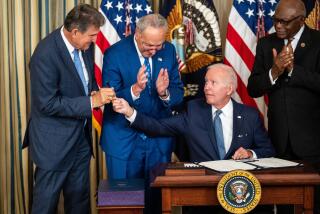Keep FDA Free to Curb Nicotine
The greatest flaw in the settlement negotiated by 40 state attorneys general and the tobacco industry lies in its attempt to restrict the Food and Drug Administration’s authority to regulate nicotine, an addictive drug. Repairing that flaw presents no insurmountable challenge. President Clinton and Congress must together insist that the FDA remain unfettered as it carries out its mandated responsibility to protect public health. A deal that tries to restrict the FDA to anything less than full freedom of action is unacceptable.
Some attorneys general, eyeing the billions of dollars that their states stand to gain from the tobacco industry over the next 25 years, fear that any significant changes made in the agreement at the federal level could destroy it. That, we think, is nonsense. This fight is over. By agreeing to cover the states’ costs for treating patients with tobacco-related diseases and to finance anti-smoking campaigns, the cigarette makers are implicitly conceding the toxicity of their product, and their liability for the consequences of that. The industry is simply in no position to insist on conditions limiting what the FDA can do. Neither, it goes without saying, can the state attorneys general commit the federal government to hamstringing one of its most important regulatory agencies.
The FDA must be free to move quickly and unconditionally to regulate nicotine and so deny cigarettes their addictive power. That is not a process that should take up to 12 years, as the agreement would have it, or be contingent on the absurd, impossible requirement that the FDA show that regulation would not give rise to a black market.
Former Surgeon General C. Everett Koop and former FDA head David Kessler, two of the nation’s most influential anti-smoking activists, insist that the FDA’s hands not be tied. So does President Clinton. Congress can do no less.
More to Read
Sign up for Essential California
The most important California stories and recommendations in your inbox every morning.
You may occasionally receive promotional content from the Los Angeles Times.










